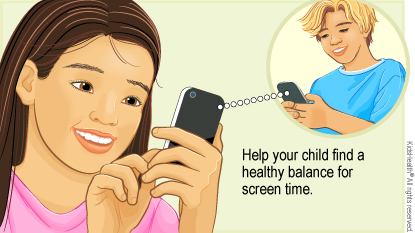Screen Time Guidelines for Your Teen
Screen time (also called media use) is when someone is using a screen such as a computer, tablet, phone, TV, or other device. Screens are a big part of teens' lives, for learning, entertainment, and connecting with others. But too much media use can take away from getting enough physical activity and sleep, doing homework, being with friends, and spending time with family. These tips can help your teen find a healthy balance.


Talk openly with your teen about screen use. Work with them to make a screen use plan, which can include:
-
what websites, games, movie ratings, and social media align with your family values
-
balancing screen time with other things (Screen time should not replace time needed for sleeping, eating, being active, studying, and interacting with family and friends.)
-
how to stay safe online
-
the age at which family members can get a cellphone
-
when screen time is not OK (for example, during meals or homework time)
-
what passwords they need to share with you
-
what safety features will be used (for example, kid-safe browsers, website blockers, and privacy settings)
-
whether you will check their activities (such as browsing history, social media conversations, and texts)
-
rules about where devices are kept and used

-
You think your teen is spending too much time on media use.
-
You're worried about how your teen is using screen time.
-
Your teen seems sad or depressed, or doesn't want to spend time with others.

How can I keep my teen safe during their media use? Talk to your teen about screen risks such as bullying, inappropriate content, and privacy concerns. Suggest these safety tips:
-
Always be kind on social media.
-
Don't use their real name on social media.
-
Don't share personal information, like addresses, phone numbers, passwords, or where they go to school.
-
Don't message or chat with strangers.
-
Never agree to meet up with someone they met online.
-
Tell a parent or trusted adult right away if someone:
-
threatens them or others
-
bullies them
-
talks about doing something violent like hurting themselves or someone else
-
talks about sex, sends photos of their body (or asks for photos of your child's), or says something about your child's body
What else can parents do? Set a good example for healthy screen time use. Limit the time you spend using your phone and other screens. Don't use your phone during family times, like meals. Balance your screen time with physical activity, getting enough sleep, and interacting with family and friends.